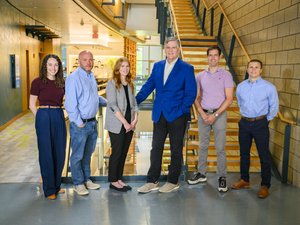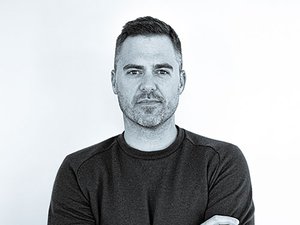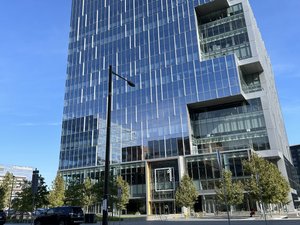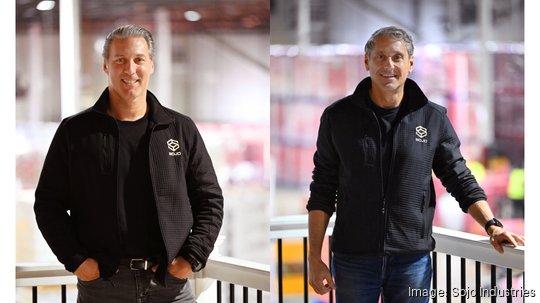
That variety pack of seltzer, soda or beer you just bought at the grocery store? It may have been packaged by robots in Bucks County.
Drink variety packs have skyrocketed in popularity but are a pain point in the production process, a problem that two entrepreneurs are working to solve through their Bristol-based startup Sojo Industries.
The company was founded in 2021 by Barak Bar-Cohen and Steve Rubin, two former C-suite executives of companies that have exited for a combined roughly $3 billion. Now they're using their experience in the logistics, technology, transportation and beverage industries with an eye to cornering variety pack packaging.
Variety packs are big business. According to an August 2022 report from market research company IRi, they accounted for $3.9 billion of hard seltzer sales in 2021, with no other specific flavor accounting for more than $422 million.
Bar-Cohen is no stranger to beverages, having served as chief operating officer of Bai, the Princeton, New Jersey-based antioxidant beverage brand that was acquired for nearly $2 billion by what is now Keurig Dr. Pepper (NASDAQ: KDP) in 2017. It was there that Bar-Cohen saw the booming demand for variety packs, which sometimes accounted for 40% to 50% of Bai's production volume in a given month, he said. Even after exiting the company, he continued to get calls from companies inquiring about how the brand was able to make its variety packs so efficiently.
The answer: robotics.
Variety packs prove difficult, particularly for emerging brands, because brands often don't own the ingredients, the warehouses, the distribution network or directly employ the people in their production facilities. That means their different end products can be scattered in warehouses across the country, making combining different flavors into variety packs "really complicated in a supply chain ecosystem," Bar-Cohen said. When big box retailers like Sam's Club, BJ's Wholesale Club, or Costco place orders at different cadences, it further complicates the process.
As a way to streamline operations, Bar-Cohen's idea was to combine his use of robotics at Bai with making packaging operations mobile by bringing robots directly to beverage warehouses. That solution helps companies cut down on supply chain obstacles, save on labor costs and become more sustainable with less shipping.
Sojo Industries uses robotics from leaders like FANUC in their facilities. The robotics help automate almost every aspect of the packaging process, like loading cans and bottles into variety packs, labeling the products, and tracking them through the distribution process.
The company has developed two products which are effectively a hub-and-spoke model, Bar-Cohen said. With its Sojo Sprint option, cans and bottles from beverage companies are shipped to and packaged in variety packs in one of Sojo's warehouses. With Sojo Flight, Bar-Cohen and his team take their packaging model on the road, setting up shop with their robotics and technology for weeks or months at a time in warehouses where beverage companies already house their operations.
Presently, Sojo Flight is running operations for beverage companies in places like Denver, Miami and Washington state. It makes up about 20% of business, but Bar-Cohen expects that to jump to 30% to 40% over the next 24 months.
Sojo Industries works with worldwide beverage brands and local breweries and distilleries alike, though Bar-Cohen declined to name specific customers.
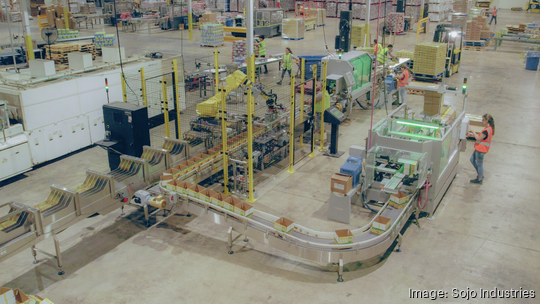
To bring Sojo to market, Bar-Cohen teamed up with his longtime friend Steve Rubin. Like Bar-Cohen, Rubin had extensive experience, albeit in a different industry. He was formerly the CEO of container shipping giant Horizon Lines, which he sold for $607 million to Matson Lines (NYSE: MATX) before serving as head of ITS ConGlobal, which he sold to a private equity group for over $500 million in 2017.
Their combined expertise has led to quick success for the young Sojo Industries, which last calendar year – the company's first full year in operation – had just under $4 million in revenue. This year, the company is on pace to triple or quadruple that figure.
In addition to its Bristol headquarters, Sojo Industries has facilities in California and Indianapolis and is set to open a new outpost in Texas in the coming months. Bar-Cohen said they are projecting to reach profitability in Bristol by the end of 2023, and the company as a whole could do the same as early as the second quarter of 2024 unless they decide to open more warehouses.
To fund the business, Sojo Industries raised a $4 million seed round in 2021, $6.2 million in 2022 and most recently closed on $2.8 million of follow-on funding in September. Both Bar-Cohen and Rubin have invested in the venture and other investors include Rowan Innovation Venture Fund and Tech Council Ventures.
Sometime next year, they plan to raise additional funding, in the range of $10 million to $12 million, Bar-Cohen said. Those funds will be earmarked for continued investment in robotics, mobile manufacturing and general technology.
The company may also look to grow its physical footprint near its Bristol headquarters, which span 100,000 square feet at 220 Rittenhouse Circle. There, it has about 40 employees, a figure that Bar-Cohen said could swell by 10 to 20 over the next four to six quarters.
"There's some real opportunities out there, so we would look to expand the physical footprint on an opportunistic basis. And I can see us doing that," Bar-Cohen said.
As Sojo Industries grows, Bar-Cohen said it could also be a force across a number of retail industries beyond beverages.
"We have all of the major beverage brands that you can think of [as customers]," Bar-Cohen said. "The vision [for the company is], today start with beverage, tomorrow we go to food and snack, the next day we go into health and beauty, and then we get to pharmaceutical. We're sort of looking at this as a wider opportunity where there's assembly, packaging automation or robotics required."
